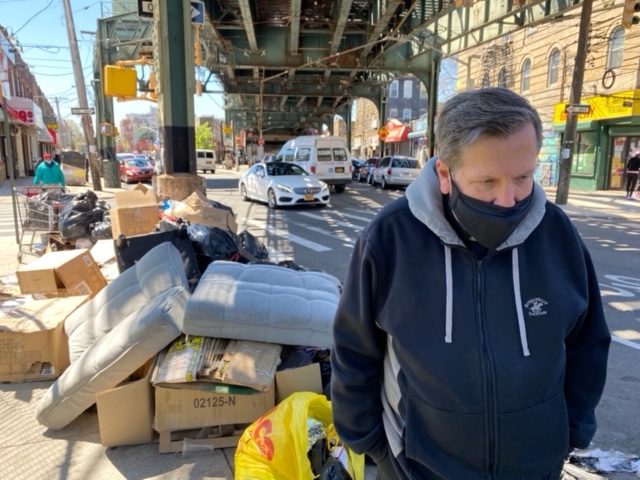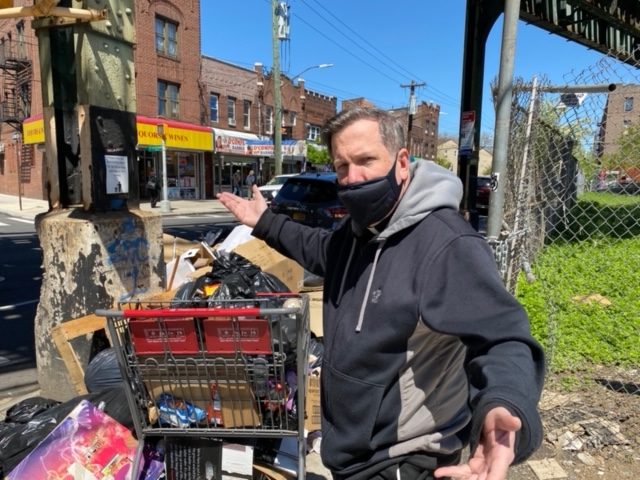
EAST NEW YORK — Busted wooden pallets, discarded sofa cushions, an abandoned shopping cart, and black plastic bags bursting with household refuse clogged a sidewalk near New Lots Avenue and Cleveland Street on April 26.
Some pedestrians chose to veer onto the roadway instead of stepping through flattened pieces of cardboard, broken liquor bottles, and other trash.
“This is somewhat improved,” said Father Edward Mason, pastor of nearby Mary, Mother of the Church Parish. “This is about a quarter of how bad it has been.”
The spot, and more than a dozen others, have been eyesores at least since September 2019 when Father Mason became pastor of the parish, two blocks away on Linwood Street.
Father Mason and his parishioners are preparing a campaign to urge stepped-up local enforcement of New York City regulations that prevent illegal dumping and other forms of littering.
The pastor recalled how, on his first day, he took his own tour of the neighborhood and passed Cleveland and New Lots. He was appalled to see “women with baby carriages, senior citizens, and handicapped people, having to navigate walking in traffic, on a bus route, because the sidewalk is impassable.”
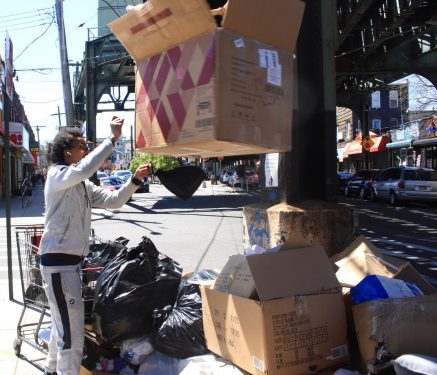
Now, nearly two years later, Father Mason said the problem persists. To prove his point, he conducted a brief tour of the junk-cluttered spot. As he spoke, a man walked up with a large cardboard carton and flung it onto the closest pile.
“Excuse me,” Father Mason said, but the man ignored him. The priest shrugged and shook his head, “You can’t make this stuff up.”
“I caught one guy red-handed here two weeks ago,” he added. “It looked like it might have been from somebody’s rehab — some kind of building materials. I asked him why he was doing it. He just shrugged and said, ‘It’s already a mess here.’ And I’m like, ‘You’re just adding to it!'”
Perhaps that is about to change.
The Dignity of the Community
A few hours before our April 26 tour, Father Mason sat in on a phone call between a deputy enforcement official from the New York Department of Sanitation (DSNY) and East Brooklyn Congregations (EBC) representatives.
Father Mason said the parish is a member of EBC, a confederation of more than 40 churches, schools, and homeowners’ associations dedicated to improving the quality of life in their neighborhoods.
“It was very positive, very hopeful,” Father Mason said. “We’re identifying 10 sites that we want cleaned up. And that’s just to start. And we want to talk about enforcement. Their response was, ‘Yes, we do too.’
“But the cleanup is the easy part. Sanitation does reasonably well cleaning up, but it’s back immediately. So the real issue is enforcement.”
Father Mason is a longtime advocate and promoter of quality-of-life issues, like affordable housing for people in the Diocese of Brooklyn.
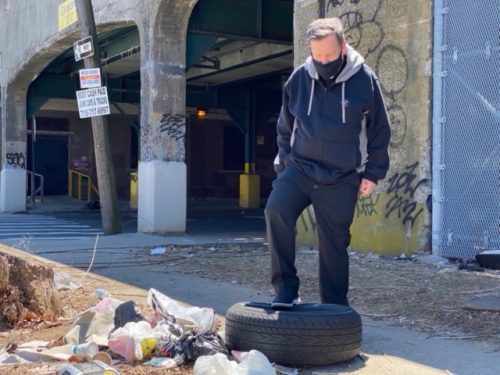
His previous assignment was pastor of Our Lady of the Presentation-Our Lady of Mercy, Bedford-Stuyvesant. He has the same missions at Mary, Mother of the Church Parish, which comprises St. Gabriel the Archangel and St. John Cantius parishes.
Its parishioners, he said, are mainly working-class immigrants burdened with unemployment, scant affordable housing, and the COVID-19 pandemic.
And Father Mason said the illegal dumping of unsightly, foul-smelling refuse that attracts vermin makes things worse.
Just down the street from the church on Linwood, he pointed to a rat hole near a pile of broken bathroom tiles, furniture, a discarded flat-screen TV, a tire, clothing, and plastic bags of rubbish, all strewn for about half a block southeast of Linwood Playground.
“It dehumanizes the people who live here,” he said of the haphazard tossing of waste. “It assaults the dignity of the community.”
A Matter of Convenience
Father Mason has questioned why this area of East New York is a go-to site for dumping.
He said he suspects the perpetrators aren’t local residents, because, he noted, why would anyone defile their own neighborhoods?
“There’s a pattern as to where the dumping takes place,” the priest said. “It takes place often in front of unused, unoccupied, abandoned property — empty lots.”
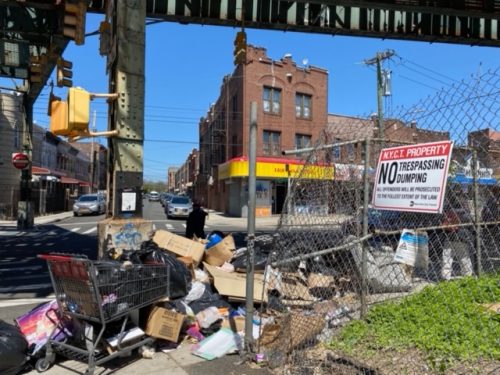
The unauthorized dump at Cleveland and New Lots is enclosed by a chain-link fence, with the junk piled against it. A sign affixed to the fence states that the lot belongs to the Metropolitan Transportation Authority and warns against trespassing and dumping.
“All offenders will be prosecuted to the fullest extent of the law,” the sign read.
This spot, and the one down the street from the church, are not inside MTA property. But they are snug against the terminus of the 3 Train at the Livonia Yard.
The Tablet contacted the MTA about trash discarded outside the MTA land. Spokesman Shams Tarek said MTA investigators were sent to the neighborhood to take pictures and evaluate the conditions.
“What we saw were tons of trash on the streets and the sidewalks outside our property,” he said on April 27. “The determination from our maintenance people, and our attorneys, is that it is outside of the fence.”
Therefore, Tarek said, the agency charged with handling the mess would be the city.
Specifically, that task goes to the New York City Department of Sanitation (DSNY), which has many responsibilities, the biggest one being the collection of household trash. But it’s also charged with curbing illegal dumping.
Belinda Mager, a DSNY spokeswoman, explained that the agency does not operate “landfills,” but it does require contractors to pay a licensed “carter” to carry away debris such as broken pieces of drywall, masonry and concrete, or discarded office furniture.
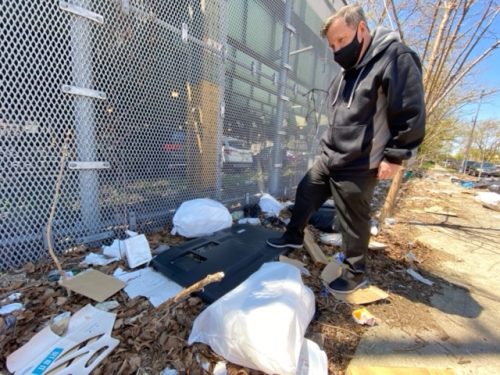
A whole industry has grown up in New York City around “junk removal.” To gauge its size, just plug those words into a Google search.
The city’s Business Integrity Commission (BIC) handles licensing for carters. Another option is for a contractor to register with BIC as a “self-hauler.” Both carry the trash to “private transfer stations.”
The BIC also charges fees for licensing. Every two years, a carting business pays $5,000, plus additional fees ranging from $500-$600 for each vehicle and each “key” employee.
A self-hauler pays a $1,000 registration fee, plus another $400 per vehicle. Both are good for two years.
Illegal dumping fines range from $4,000 to $18,000.
However, Father Mason suspects some contractors or their workers are trying to skirt those fees via illegal dumping. Getting caught is a calculated risk.
“It’s a matter of convenience,” he said. “But if you’re doing renovation work, or whatever, you got to make arrangements to have that picked up or carted off. It’s part of the normal fee for a contractor. That’s their job.”
See Something, Say Something
DSNY spokeswoman Mager explained that discarding junk from a vehicle is the legal definition of “illegal dumping.”
But, as demonstrated by the man seen tossing the cardboard carton, illegal dumping can be a magnet for walk-up dumping by pedestrians, which is also punishable by fines. For example, penalties for discarding recyclable cardboard start at $25 for the first offense.
Mager was incredulous to hear about the man tossing the carton.
“We’ll pick that up from your house,” she said. “Use our services, please!”
Information about when and how to dispose of household trash and recycling is at: https://www1.nyc.gov/assets/dsny/site/home.
Father Mason said parishioners are ready to step up reporting illegal dumping when they see it.
The DSNY already has a reporting system in place. According to the agency’s website, anyone “can report illegal dumping from a vehicle that has happened repeatedly at the same location.”
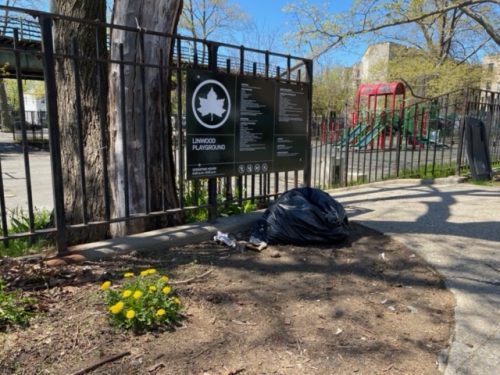
Helpful information includes the vehicle’s license plate number; a description of the vehicle; type and amount of material dumped; and the time, date, and location of the dumping.
DSNY “will monitor the location within three to seven business days and try to catch the person in action, but will not remove the trash,” according to the website.
Mager also explained that it does not enter private property to remove trash; that is the responsibility of the landowner, who also faces fines for violations.
DSNY also offers a reward program in which people who report illegal dumping may be eligible to receive up to half of the fines collected. The agency has a tip form and affidavit, which must be notarized and mailed to the agency.
The forms are available online at: https://www1.nyc.gov/assets/dsny/site/services/cleaning/cleaning-illegal-dumping.
“We need residents to help us,” Mager said. “As the saying goes, ‘If you see something, say something.’ Let us know because we can send out our sanitation police officers to monitor the area, and we do catch people.”
Father Mason said the reward programs certainly have a place, but he said the parish’s efforts would focus on working directly with people in power. The April 26 phone call between EBC and the sanitation official was a good first step, he said.
“We demand respect and accountability on the part of the city officials,” Father Mason said. “That’s who we are and our track record out here.”
